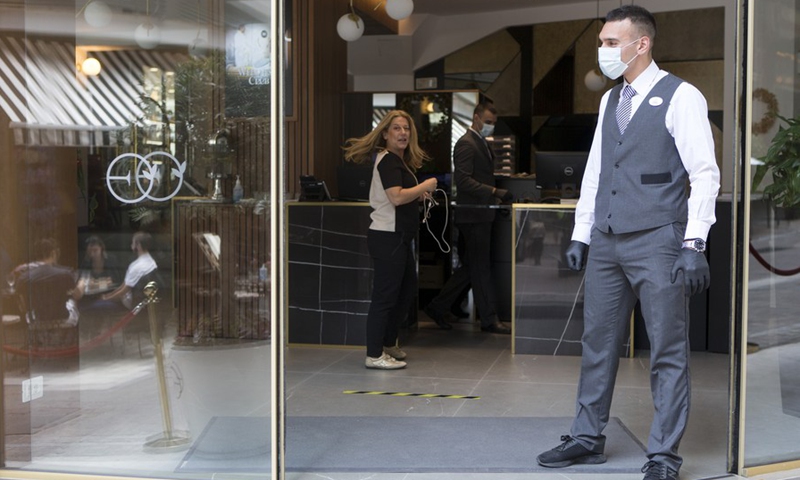
Visitors take photos on the Hill of Acropolis in Athens, Greece, on Aug. 15, 2020.(Photo: Xinhua)

Tourists visit the Stoa of Attalos in the archaeological site of the Ancient Agora in Athens, Greece, on June 13, 2019.(Photo: Xinhua)

A hotel employee wearing a face mask stands at the gate of a hotel in Athens, Greece, on June 1, 2020.(Photo: Xinhua)
Greece's tourism sector, a vital pillar of the country's economy for decades, has been forecast to recover and reach the 2019 pre-pandemic record levels this year by local officials and industry experts.
Revenues from tourism soared 342 percent in the first three months of 2022 compared with the same period the previous year, Tourism Minister Vassilis Kikilias told local television on Thursday.
However, many businesses in this industry are struggling to find personnel to fill in thousands of job vacancies, as people, in particular after the pandemic shock, seem to seek more stability in the workplace, experts told Xinhua in recent interviews.
According to a study released recently by Institute SETE, the Research Institute of the Greek Tourism Confederation (SETE), about 22-24 percent of the job positions in the organograms of Greek hotels were not covered last year.
Specifically, during the third quarter of 2021, the peak season for Greek tourism, hotels had on their organogram 244,000 positions, out of which 53,000 positions were not filled, Aris Ikkos, Research Director of Institute SETE, told Xinhua.
The problem persists this year. The shortage of labor in hotels already existed before the COVID-19 pandemic, but it has become a more serious problem than it was before, according to Ikkos.
"During 2020 when hotels were closed, a lot of people found jobs in other sectors and they remained in those sectors, because they were happier there or they felt more secure there," he said.
Moreover, "in 2021, nobody expected the season to be as good as it was in the end. So many hotels were late in hiring and when they needed the staff, they could not find them anymore," he added.
It has become a tough issue for hoteliers in the country to hire chambermaids, waiters, baristas, and receptionists and support staff.
Meanwhile, staff shortage has also affected the operation capacity in the food and beverage sector.
Anastasios Zissopoulos, President of the Hellenic Chef's Federation (HCF), told Xinhua that currently there is a shortage of approximately 20,000 employees in the sector.
"At the moment, we have businesses that will not be able to operate at 100 percent of their capacity for the simple reason that there are no people to cook and make desserts," Zissopoulos said, explaining that the so-called Great Resignation phenomenon was not new to Greece and the tourism industry in general.
In the past three years, just after Greece had emerged from a decade-long debt crisis, some 40 to 50 percent of chefs left Greece seeking experience all over the world or opted to change profession, he noted.
Zissopoulos is not very optimistic about the government's ongoing efforts to offer incentives in particular to youth, promising higher salaries and better working conditions, or the idea of facilitating the hire of staff from abroad.
Especially kitchen's work, like fine-tuned clocks or orchestras, needs experienced and passionate personnel, he stressed.
From Ikkos' perspective, the difficulty in finding people to work in the tourism industry has a lot to do with the fact that "the activity is seasonal and people feel insecure."
The most important step, in his view, is to try to extend the season so that employees feel more secure.






